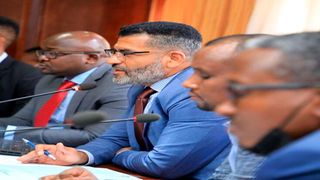
Chairperson of the Public Investment Committee Abdulswamad Nassir (centre) with other members during a committee sitting on January 27, 2022.
| Jeff Angote | Nation Media GroupNews
Premium
MPs’ bombshell on National Qualifications Authority
What you need to know:
- Parliamentary committee observes that the authority has been performing the function, which is not backed by any law.
- Before any regulations come into force, they must be considered by the Committee on Delegated Legislation and passed by the House.
Thousands of graduates from local and foreign universities whose academic papers were certified and regularised by the Kenya National Qualifications Authority (KNQA) are staring at uncertainty after it emerged the powers to regularise papers by the authority are not backed by law.
It emerged during a parliamentary committee meeting yesterday that the gazette notice published by the Education Cabinet Secretary in 2018 conferring the powers to KNQA on certification of academic papers were not considered by lawmakers as required by law.
The National Assembly Public Investments Committee (PIC), in a meeting with the KNQA observed the authority has been performing the function, which is not backed by any law.
The committee chairman, Mr Abdulswamad Nassir (Mvita), pointed out that before any regulations come into force, they must be considered by the Committee on Delegated Legislation and passed by the House.
“In this case, none was brought to Parliament. The Cabinet secretary ought to have written to Parliament,” Mr Nassir said.
“The Committee on Delegated Legislation would have sat down with the Committee of Education and considered the regulations by checking whether they are in conflict with the mandate of other bodies. As it is, you are performing a function that does not belong to you,” Mr Nassir added.
Mr Nassir warned that should someone challenge that particular function of KNQA in court, then the authority will be forced to return all the fees it has been collecting while certifying the academic papers of various people.
“We are actually looking at the liability that you might go through if this is challenged in court,” Mr Nassir said.
Under the Standing Orders 210, the committee on delegated legislation is mandated to consider any statutory instruments on whether it is in accordance with the provisions of the constitution, the Act pursuant to which it is made or other relevant written laws.
KNQA Managing Director Juma Mukhwana told the committee he was not aware the regulations were not considered by Parliament.
“When I joined the institution in 2018, my assumption was that the regulations passed through Parliament before being gazetted. I’m hearing for the first time that they were not considered by Parliament,” Dr Mukhwana told the lawmakers.
He, however, maintained that the function to certify academic qualification remains KNQA’s, warning that if it is taken away from them, thousands of students might suffer.
He told the committee that about 200 students from local and foreign universities seek the authority’s services on a daily basis.
The MD blamed sibling rivalry in the academic section especially with Technical and Vocational Education and Training Authority (TVETA) over the stalemate.
“This is a matter that as different institutions we had a retreat in September last year in Naivasha and resolved only to learn two weeks later that it has been taken to court again,” Dr Mukhwana said.
He urged the committee to assist them in resolving the matter with TVETA to avoid unnecessary wrangling over their roles.
Tinderet MP Julius Melly pointed out that the committee will need all the documents on the regulations that outlined the authority’s function before determining the area of conflict.
“The authority was actually formed to be the regulator of regulators but it appears that one institution has usurped the powers of another,” Mr Melly said.
The authority was set up in 2015 to help coordinate and harmonise education, training, assessment and quality assurance of all qualifications awarded in the country.
According to the regulations, the authority oversees and regulates the work of the basic, TVET and university education sectors and brings harmony and coordination in general.
The authority works very closely with the Commission for University education (CUE), TVETA, the Kenya National Examinations council (Knec), The Kenya Accountants and Secretaries’ National Examinations Board (Kasneb), universities, TVET institutions, local and international assessment and examination agencies, professional bodies and other organisations within the sector to create one platform for all quality assured qualifications in Kenya.
The committee wants the authority to submit the gazette notice published by CS Magoha, all the correspondents it has been having with other institutions regarding its role and any other relevant document pertaining to their role by today.
Should they find any anomaly in the documents submitted, the committee said it would invite Education Cabinet Secretary George Magoha for interrogation.





